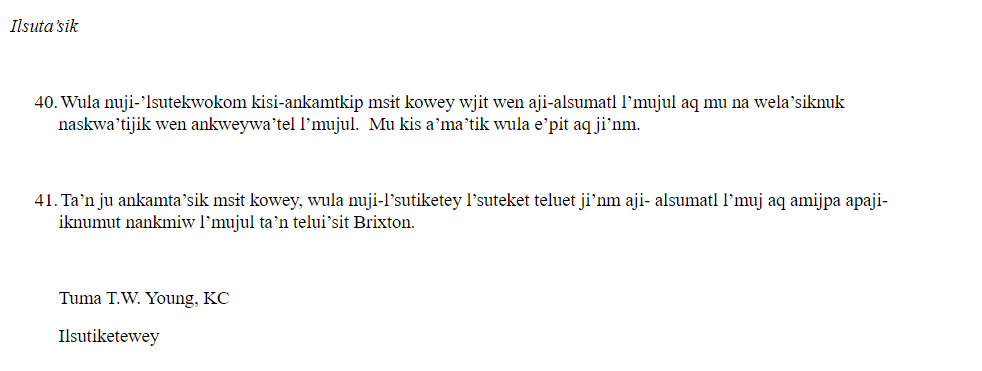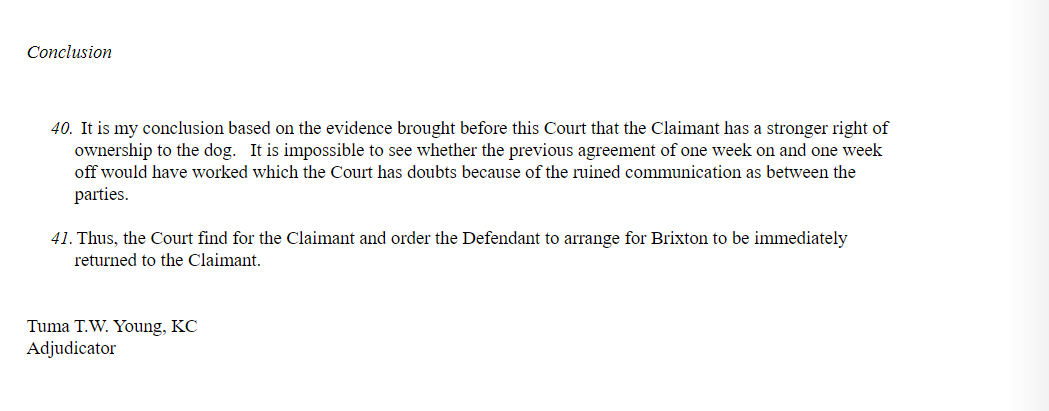
Eskasoni lawyer and small claims adjudicator Tuma Young calls it a move towards Indigenous inclusion

On the face of it, the recent Nova Scotia small claims court case MacKinnon v. MacKinnon would seem significant mainly to the parties involved – settling a dispute over who has the better claim to the family pet following a breakup.
But for Cape Breton lawyer, professor, and small claims court adjudicator Tuma Young, the case represents a milestone in reflecting the importance of Indigenous culture and language in Canada. The reason? He wrote his decision in Mi’Kmaw, with translations into English and French.
“I hope that by taking this small step, I have shown that it is possible for a pluralistic society to accommodate Indigenous language, and by extension accommodate some of the concepts behind Indigenous law,” says Young, a member of the Eskasoni First Nation.
A small claims adjudicator for four years, Young usually writes his decisions in English, but decided a while back to write a decision in Mi’Kmaw “should the right case come along."
As a fluent speaker of Mi’Kmaw, Young says that writing the decision in that language wasn’t difficult – “in my mind, I have to translate things into English anyway."
Translating legal concepts into Mi’Kmaw from English
However, some challenges did arise, because Mi’Kmaw is a polysynthetic language that is structured around the verb. In contrast, Indo-European languages such as English are monosynthetic and structured around the noun.
“So sometimes I had to think twice to make sure that I conveyed the proper meaning of what I wanted to say, but being fluent in both languages, I’m pretty good at it.”


Conclusion of Tuma Young’s decision in Mi’Kmaw and English
Young says the Mi’Kmaw language also has words that reflect an Indigenous approach to legal concepts. For example, “courthouse” loosely translates in Mi’Kmaw into “the place where you correct behaviour.” It isn’t about punishment, Young notes, "but a place to help lead people on the right path and get parties to a dispute to do the right thing.”
Young says the decision to write in Mi’Kmaw was personal, not something that came from the court system or the Nova Scotia government. “But it is time to do this,” Young says, noting that the province named Mi’Kmaw its “first language” last year.
Written decisions like this, and more to come, will show people that Indigenous language is important in the legal system and there’s room for it.
The Nova Scotia Department of Justice said in a statement that it would continue to work on access to justice for Indigenous people.
“As Nova Scotia continues its important work on an Indigenous Justice Action Strategy, we are pleased to see that the Mi’kmaw language reflected in this small claims court decision,” read the statement.
“This is one small example of the importance of diversity and community representation in our justice system.”
Neither of the parties in the case is Indigenous, but by issuing the ruling in the Mi’Kmaw, he says it is a symbol that the language “has a place” in Nova Scotia’s legal system.
Pets as property
As for the case itself, Young has dealt with many similar cases involving a dispute over dog ownership following a breakup, so determining the facts to decide on was not particularly complicated.
The parties, in this instance, purchased Brixton, a golden retriever, together in August 2021 but broke up in May 2022. For a while, there was an agreement for each to have equal time with the dog, settling on a one-week on, one-week off schedule.
However, the defendant in this case, Emmalee MacKinnon, decided the arrangement was not working and kept Brixton. Her ex, Ryan MacKinnon, filed a claim in September 2022 to get the dog back.
Emmalee claimed she kept Brixton because she was worried about the health and welfare of the dog. She claimed Ryan would go to the gym in the morning and not come home until after work. Ryan said that friends looked after the dog when he was not home.
Emmalee argued that she was the one who found and initially dealt with the breeder, and that she did most of the training with Brixton. However, Ryan provided receipts that indicate it was he who purchased the dog. The defendant, in response, claims the ownership paperwork did not show her name because, at the time, she asked Ryan to sign the paperwork while she held the dog.
Young acknowledged in the written decision that “it appears that both shared in the raising of the animal.” Each party also provided evidence that they shared the expenses, food costs, pet insurance and veterinary fees.
However, in the end, Young decided in favour of Ryan because he “has the stronger right of ownership” of Brixton.
There are many factors to be considered, and the law considers animals to be personal property, Young wrote in his ruling. A dispute between people claiming the right to possess an animal must be determined based on ownership (or ownership agreements), not the animal’s best interests, as long as no mistreatment or abuse is involved.
Factors to consider include whether the animal had been owned by one of the parties before the relationship; who purchased the animal; who exercised care and control; who paid for the animal’s upkeep; and what happened to the animal after the relationship between the parties changed.
Young noted in the decision that in a previous case of a dog ownership dispute, Gardiner-Simpson v. Cross, adjudicator Eric Sloan wrote that “in cases where property ownership of a family pet is involved, joint ownership is the worst situation that can arise.”
Sloan wrote: “There really is no way of dividing the asset (the dog) or to force a sale where the proceeds can be divided between the parties.”
Young’s ruling says it is impossible to know whether the previous agreement of one week on and one week off would have worked for this couple because of the "ruined communication" between the parties.
"Ultimately, it came down to which party has a better property interest in the dog.”